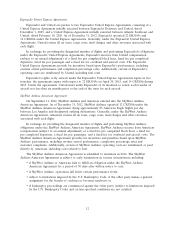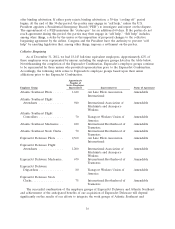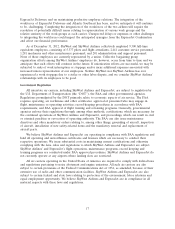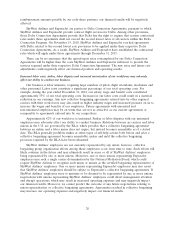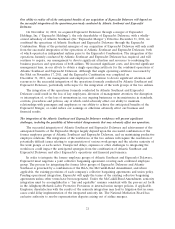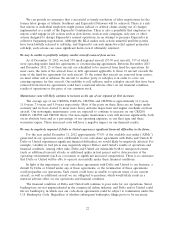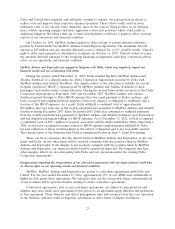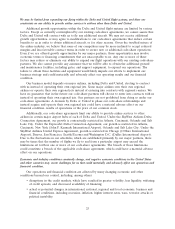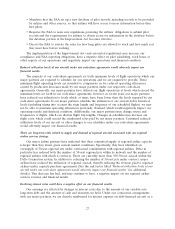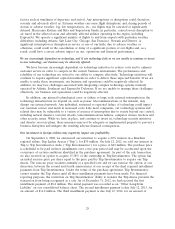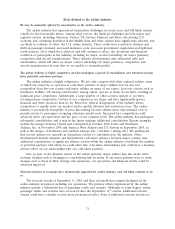SkyWest Airlines 2012 Annual Report Download - page 26
Download and view the complete annual report
Please find page 26 of the 2012 SkyWest Airlines annual report below. You can navigate through the pages in the report by either clicking on the pages listed below, or by using the keyword search tool below to find specific information within the annual report.We can provide no assurance that a successful or timely resolution of labor negotiations for the
former labor groups of Atlantic Southeast and ExpressJet Delaware will be achieved. There is a risk
that unions or individual employees might pursue judicial or arbitral claims arising out of changes
implemented as a result of the ExpressJet Combination. There is also a possibility that employees or
unions could engage in job actions such as slow-downs, work-to-rule campaigns, sick-outs or other
actions designed to disrupt ExpressJet’s normal operations, in an attempt to pressure ExpressJet in
collective bargaining negotiations. Although the RLA makes such actions unlawful until the parties
have been lawfully released to self-help, and ExpressJet can seek injunctive relief against premature
self-help, such actions can cause significant harm even if ultimately enjoined.
We may be unable to profitably redeploy smaller aircraft removed from service.
As of December 31 2012, we had 559 small regional aircraft (37-50 seat aircraft), 557 of which
were operating under fixed-fee agreements or revenue-sharing agreements. Between December 2013
and December 2015, 21 of these aircraft are scheduled to be removed from fixed-fee operations. In
most cases, the term of the aircraft lease or debt agreement applicable to those 21 aircraft exceeds the
term of the fixed-fee agreement for such aircraft. To the extent that aircraft are removed from service,
we must either sell or sublease the aircraft to another party or redeploy it in order to cover our
carrying expenses for that aircraft. Our inability to sell, sublease and/or redeploy aircraft that have been
removed from fixed-fee agreements could have a material adverse effect on our financial condition,
results of operations or the price of our common stock.
Maintenance costs will likely continue to increase as the age of our regional jet fleet increases.
The average age of our CRJ200s, ERJ145s, CRJ700s and CRJ900s is approximately 11.2 years,
11.0 years, 7.6 years and 5.0 years respectively. Most of the parts on these fleets are no longer under
warranty and we have started to incur more heavy airframe inspections and engine overhauls on those
aircraft. Our non-engine maintenance costs are expected to continue to increase on our CRJ200,
ERJ145, CRJ700 and CRJ900 fleets. Our-non engine maintenance costs will increase significantly, both
on an absolute basis and as a percentage of our operating expenses, as our fleet ages and these
warranties expire. Those increased costs will have a negative impact on our financial results.
We may be negatively impacted if Delta or United experiences significant financial difficulties in the future.
For the year ended December 31, 2012 approximately 97.0% of the available seat miles (‘‘ASMs’’)
generated in our operations were attributable to our code-share agreements with Delta and United. If
Delta or United experiences significant financial difficulties, we would likely be negatively affected. For
example, volatility in fuel prices may negatively impact Delta’s and United’s results of operations and
financial condition. Among other risks, Delta and United are vulnerable both to unexpected events
(such as additional terrorist attacks or additional spikes in fuel prices) and to deterioration of the
operating environment (such as a recession or significant increased competition). There is no assurance
that Delta or United will be able to operate successfully under these financial conditions.
In light of the importance of our code-share agreements with Delta and United to our business, a
default by Delta or United under any of these agreements, or the termination of these agreements
could jeopardize our operations. Such events could leave us unable to operate many of our current
aircraft, as well as additional aircraft we are obligated to purchase, which would likely result in a
material adverse effect on our operations and financial condition.
The financial condition of Delta and United will continue to pose risks for our operations. Serial
bankruptcies are not unprecedented in the commercial airline industry, and Delta and/or United could
file for bankruptcy, in which case our code-share agreements could be subject to termination under the
U.S. Bankruptcy Code. Regardless of whether subsequent bankruptcy filings prove to be necessary,
22


